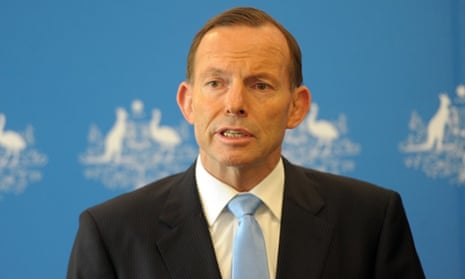Australia will send a military force to the United Arab Emirates to contribute to the US campaign of airstrikes against Islamic State (Isis) militants in Iraq.
In response to a formal request from the US for specific Australian defence force (ADF) capabilities, the prime minister, Tony Abbott, said Australia would supply 600 personnel – made up of 400 from the air force and 200 from the military, including special forces – along with equipment to the coalition force against the Isis movement.
Up to eight Royal Australian Air Force F/A18F Super Hornets combat aircraft, a Wedgetail surveillance aircraft, and a tanker and transport aircraft will be sent to the United Arab Emirates.
“In addition, the Australian Defence Force will prepare a special operations task Group as military advisers that could assist Iraqi and other security forces that are taking the fight to the [Isis] terrorists,” said Abbott. Military advice would also be provided to Kurdish Peshmerga forces in northern Iraq.
ADF personnel will be based in the US headquarters “to ensure close coordination” with the US and to support planning and logistics.
“We are not deploying combat troops but contributing to international efforts to prevent the humanitarian crisis from deepening,” said Abbott.
In recent weeks Australia has provided air lift assistance, transporting humanitarian supplies and weapons in the region.
While he said there would be no boots on the ground in Iraq, Abbott left open the possibility that the mission could extend into combat operations, perhaps stretching for “many many months.”
“There are obviously further decisions to be taken before Australian forces will be committed to combat operations in Iraq,” Abbott said.
“Nevertheless, Australia is prepared to engage in international operations to disrupt and degrade Isil because of the threat that this murderous death cult poses not just to the people of Iraq, not just to the people of the Middle East, but to the whole world, including to Australia.”
A conversation with Barack Obama gave him the understanding that the US president is prepared for a “lengthy” mission.
“Our armed forces are all volunteers. They understand the risk that they run if deployed to combat zones, and we will do our best to ensure that all precautions are taken,” he said.
Greens leader Christine Milne described it as “mission creep.”
“The Greens supported the dropping of food and water and supplies into some of the isolated areas… but the minute Australia engaged in taking in weapons to arm militias we were engaged in warfare,” she told media on Sunday afternoon.
“This is an open ended commitment of young Australian lives to a United States war in Iraq. It’s hard to see how that could possibly end well for the people in Iraq or in Australia.”
She said the operation would be a “a rallying cry for young jihadis”.
“Far from reducing the threat of terrorism at home, this will only elevate that risk,” she said.
Opposition leader Bill Shorten, the national security cabinet and full cabinet were consulted ahead of the decision.
Shorten and deputy opposition leader Tanya Plibersek said while they did not do so lightly, the Labor party “support the Government’s decision that Australia has a role to play in eradicating this evil and we are reassured that our support is being provided at the request of, and in full coordination with, the Iraqi Government.
“We are also greatly heartened by the progress being made by new Iraqi Prime Minister Haider al-Abadi, in the formation of a unity government, which is vital to achieving a successful outcome against these terrorists.”
Air Chief Marshal Mark Binskin, chief of the defence force, said the situation in Syria and northern Iraq is “a highly complex operating environment in the Middle East and one that continues to evolve”.
“I know the added pressure that a decision like this places on our Defence families,” he said in a statement.
“They too are in my thoughts as we prepare for this deployment. I know that the units will ensure they are well supported while your loved ones are away.
“Disrupting and degrading [Isis] will take a comprehensive and sustained effort from the international community. If we do nothing, we risk allowing the shocking acts of [Isis] to further destabilise the Middle East region and to spread beyond the Middle East region where it will pose a greater threat to Australians.”
Abbott linked the Isis threat to a domestic security situation due to the estimated 60 Australians who are believed to have gone to fight with Isil and other groups.
“This is about taking prudent and precautionary action,” he told media in Darwin. “This is reaching out to us,” he said.
Attorney general George Brandis earlier on Sunday said intelligence agencies did not know the identity of all of them, but that any foreign fighter who had committed crimes returning to Australia would face prosecution.
During the announcement Abbott made reference to the most recent video released by Isis claiming to have beheaded British aid worker David Haines.
“The exultation and evil that was yet again on display today should make all of us more resolved than ever to do everything we can to disrupt, degrade and if possible destroy this movement,” he said.
The prime minister confirmed he will attend a UN security council meeting in New York next week, convened by Obama, to address the threat of foreign fighters.
Abbott said he had spoken with Obama as well as Iraq’s new prime minister Haider Al-Abadi and with crown prince sheikh Mohammed bin Zaiyed of the United Arab Emirates in recent days.
Governments from Middle Eastern nations formally answered last week’s call from Obama for a “broad coalition to roll back this terrorist threat”. Leaders from Egypt, Iraq, Jordan, Lebanon and the Gulf Cooperation Council - an alliance of the Sunni Arab Gulf nations, including Saudi Arabia, Qatar and the United Arab Emirates - pledged to “stand united” against Isis.

Comments (…)
Sign in or create your Guardian account to join the discussion